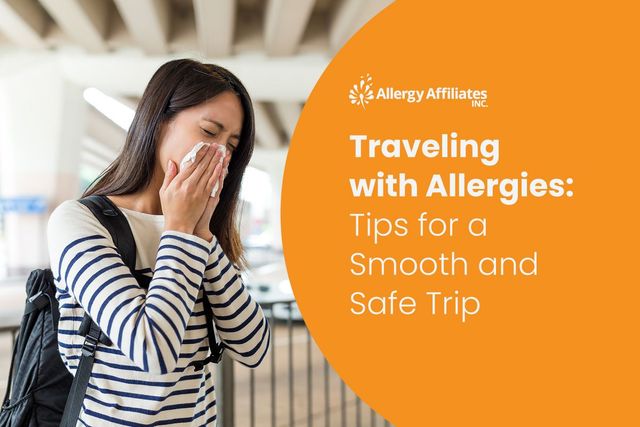Navigating baby food allergies can be challenging, but with the right guidance and knowledge, parents can effectively manage their child’s allergies.
This comprehensive guide will provide parents with essential information, tips, and resources to help them navigate the complexities of food allergies in their little ones.
From understanding common allergens to choosing suitable foods and managing allergic reactions, this guide will empower parents to make informed decisions for their child’s nutrition and well-being. With the prevalence of food allergies in children, it’s crucial for parents to be well-informed and equipped to handle these challenges.
By arming themselves with the right information and support, parents can ensure that their child’s dietary needs are met while mitigating the risks associated with food allergies.

Credit: www.ebay.com
Understanding Baby Food Allergies
Discover a parent’s essential guide to navigating baby food allergies and understanding common allergens. Gain insights on identifying allergies, introducing new foods, and keeping your little one safe and healthy.
Understanding Baby Food Allergies Baby food allergies can be a source of worry for many parents, and understanding the common food allergens and signs and symptoms is crucial for navigating this challenge. It’s essential to stay informed and vigilant when introducing new foods to your baby. By recognizing potential allergens and being aware of the signs and symptoms, you can help keep your little one safe and healthy.
Common Food Allergens
It’s important to be aware of the common food allergens that can trigger allergic reactions in babies. Some of the most common allergens include milk, eggs, peanuts, tree nuts, soy, wheat, fish, and shellfish. When introducing these foods to your baby, it’s crucial to monitor their reactions closely and be prepared to seek medical attention if any signs of an allergic reaction appear.
Signs And Symptoms
The signs and symptoms of food allergies in babies can vary, but some common indicators include rashes, hives, swelling, vomiting, diarrhea, and difficulty breathing. It’s important to note that symptoms can range from mild to severe, so it’s crucial to act quickly if you suspect your baby is experiencing an allergic reaction to a certain food. By understanding the common food allergens and being able to recognize the signs and symptoms of food allergies in babies, you can take proactive steps to ensure your little one’s safety. Stay informed, communicate with your pediatrician, and be prepared to act swiftly in the event of an allergic reaction.

Credit: www.allergyaffiliates.com
Preventing Baby Food Allergies
This parent’s guide provides essential tips for preventing baby food allergies. Learn how to navigate the world of baby food allergies and keep your little one safe.
Introduction Of Solid Foods
Baby food allergies can be a concerning issue for many parents, but taking steps to prevent them can make a significant difference. One of the crucial steps in preventing baby food allergies is the introduction of solid foods to your baby’s diet.
Timing And Food Choices
When introducing solid foods to your baby, timing and food choices play essential roles in preventing allergies. Ensuring that you make informed decisions about when and what to introduce to your baby’s diet can help mitigate the risk of developing food allergies.
Now, let’s take a deeper look at how to prevent baby food allergies by paying attention to the timing and food choices and the introduction of solid foods.
Introduction Of Solid Foods
When it comes to introducing solid foods to your baby, it’s crucial to do so at the right time. The American Academy of Pediatrics recommends introducing solid foods around six months of age. This allows your baby’s digestive system to be more mature and better able to handle solid foods, reducing the risk of developing food allergies.
When introducing solid foods, it’s important to start with single-ingredient foods. This approach can help you identify any potential allergies more easily than if you were to introduce multiple foods at once.
Timing And Food Choices
In addition to the timing of introducing solid foods, the choices of foods are also important in preventing allergies. Certain foods, such as eggs, peanuts, and dairy, have been associated with higher rates of allergic reactions. It is essential to introduce these foods carefully and pay attention to any signs of allergies that may arise.
Moreover, continuing to breastfeed while introducing solid foods can also play a protective role against food allergies. The antibodies in breast milk can support your baby’s developing immune system, reducing the risk of allergic reactions to new foods.
Managing Baby Food Allergies
Discover how to manage baby food allergies with ease. This comprehensive guide offers practical tips and insights for navigating the challenges of dealing with allergies in your little one. Learn about common allergens, alternative options, and helpful strategies for a confident and stress-free approach to managing your baby’s food allergies.
Elimination Diets
One effective way to manage baby food allergies is through the implementation of elimination diets. An elimination diet involves removing certain foods from your baby’s diet to identify and eliminate the ones causing an allergic reaction. This process requires careful observation and guidance from a healthcare professional to ensure your baby receives all necessary nutrients.
Here are a few steps to follow when implementing an elimination diet:
- Identify potential allergens: Start by identifying the common allergens such as dairy, soy, eggs, wheat, peanuts, and tree nuts. These are the usual suspects behind allergic reactions in babies.
- Remove one food at a time: Begin by removing one potential allergen from your baby’s diet. Give it a few days to see if there’s any improvement in their symptoms.
- Monitor for reactions: Keep a close eye on your baby for any signs of improvement or worsening of their allergic symptoms.
- Reintroduction of foods: After a period of avoiding a particular food, you can slowly reintroduce it to your baby’s diet. Watch closely for any reactions during this process.
- Maintain a food diary: Keep a detailed record of the foods your baby consumes and any allergic reactions they experience. This will help you identify patterns and make informed decisions about their diet.
Emergency Action Plan
It’s crucial for parents of babies with food allergies to have an emergency action plan in place. This plan provides clear instructions on what to do in case of an allergic reaction. Here are some key components to include in your emergency action plan:
| Piece of Information | Description |
|---|---|
| Allergen details | Clearly list the specific allergens that trigger your baby’s reactions. |
| Symptoms of an allergic reaction | Include a detailed description of the symptoms your baby experiences, such as rash, vomiting, or difficulty breathing. |
| Contact information | List emergency contact numbers, including your healthcare provider and local emergency services. |
| Medication instructions | Outline the correct dosage and administration of any prescribed medications or epinephrine auto-injectors. |
| Emergency response steps | Provide step-by-step instructions on what to do if your baby experiences an allergic reaction, including when to administer medication, call for help, or perform CPR. |
Remember, an emergency action plan is meant to be easily accessible to you and any caregivers involved in your baby’s daily routine. Regularly review and update the plan as needed to ensure its accuracy and effectiveness in times of need.

Credit: www.livingbeyondallergies.com
Seeking Expert Advice
When it comes to managing your baby’s food allergies, seeking expert advice is crucial. Allergies can be complex and navigating the dos and don’ts can feel overwhelming. Consulting with an experienced allergist can provide you with the knowledge and guidance you need to keep your little one safe and healthy.
Allergist Consultation
An allergist is a medical professional specialized in diagnosing and treating allergies. Seeking an allergist consultation is the first step towards understanding your baby’s specific food allergies. During the consultation, the allergist will carefully evaluate your baby’s symptoms and medical history, asking relevant questions to gain a comprehensive understanding.
Based on the information gathered, the allergist will conduct various tests to determine the specific allergens causing the reactions. These tests may include a skin prick test, blood test, or even an oral food challenge.
Testing And Diagnosis
Testing and diagnosis are integral parts of managing your baby’s food allergies. By identifying the specific allergens, you can effectively eliminate them from your baby’s diet, preventing allergic reactions. The allergist will explain the testing procedures in detail, providing you with a comprehensive understanding and answering any questions or concerns you may have.
Once the allergens are identified, your allergist will help you create a personalized management plan to keep your baby safe. This plan may include strict dietary restrictions, carrying emergency medication, and educating caregivers about your baby’s allergies.
Remember, testing and diagnosis should always be conducted under the guidance of an allergist to ensure accuracy and avoid potential risks or misinterpretations.
Frequently Asked Questions For Navigating Baby Food Allergies: A Parent’s Guide
What Can I Do For My Baby’s Food Allergy?
For your baby’s food allergy, consult a pediatrician. Identify allergens and avoid them in the diet. Introduce new foods one at a time. Keep an epinephrine auto-injector on hand in case of severe reaction. Monitor for symptoms and seek immediate medical attention if needed.
What Are The Top 9 Allergens For Babies?
The top 9 allergens for babies are cow’s milk, eggs, peanuts, tree nuts, soy, wheat, fish, shellfish, and sesame.
How Can I Help My Baby Outgrow Food Allergies?
Help your baby outgrow food allergies by introducing potential allergenic foods early, starting with small amounts, and gradually increasing exposure. Consult a pediatrician for guidance, consider allergy testing, and work with a dietitian to create a safe and balanced diet.
Can I Eat Eggs If My Breastfed Baby Is Allergic?
Yes, you can eat eggs if your breastfed baby is allergic. However, it is important to monitor your baby for any signs of an allergic reaction, such as rash or vomiting. If your baby shows any symptoms, consult with a healthcare professional before continuing to consume eggs.
Always prioritize your baby’s health and safety.
Conclusion
Navigating baby food allergies can be a challenging journey for any parent. By understanding the signs, causes, and prevention methods, you can ensure your little one grows up happy and healthy. From introducing new foods gradually to consulting with a pediatrician, taking proactive steps is vital.
Remember, your child’s safety always comes first. With patience, persistence, and proper research, you can navigate this path with confidence.

